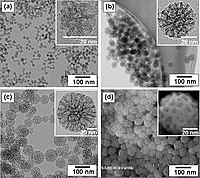
Photo from wikipedia
The CO2 (dry) reforming of hydrocarbons offers an opportunity to convert greenhouse gases into synthesis gas, which can further transform to various valued products. Here we explore the influence of… Click to show full abstract
The CO2 (dry) reforming of hydrocarbons offers an opportunity to convert greenhouse gases into synthesis gas, which can further transform to various valued products. Here we explore the influence of Rh particle size and support on the reforming of propane and methane. To that end, Rh nanoparticles with controlled sizes varying from 1.6‐8.0 nm were synthesized following a polyol reduction method and then dispersed on three different solids: CeZrO2, ZrO2, and CeO2. Catalytic turnover rates along with advanced characterization of fresh and spent catalysts reveal a linear correlation of turnover rates with Rh particle size for both methane and propane reforming. The nature and rate of coke deposition are highly dependent on the support used and its interaction with the metallic phase.
Journal Title: ChemCatChem
Year Published: 2021
Link to full text (if available)
Share on Social Media: Sign Up to like & get
recommendations!